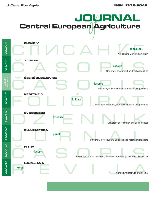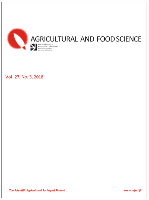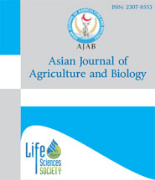
Revista de la Facultad de Agronomia de la Universidad del Zulia
Scope & Guideline
Nurturing Growth: Pioneering Research in Plant and Animal Sciences
Introduction
Aims and Scopes
- Crop Production and Management:
Research in this area covers the agronomic practices, genetic improvement, and management of various crops, focusing on yield optimization and sustainable agricultural practices. - Soil and Water Management:
This includes studies on soil health, irrigation techniques, and the effects of different fertilization methods on crop productivity and environmental sustainability. - Pest and Disease Control:
The journal publishes research aimed at understanding and managing agricultural pests and diseases, including biological control methods and the use of biopesticides. - Agroecology and Sustainability:
This scope involves research on sustainable agricultural practices, agroecological systems, and their role in mitigating climate change and enhancing biodiversity. - Food Quality and Safety:
Studies focus on improving the nutritional quality, safety, and sensory properties of food products, including the impact of agricultural practices on food characteristics. - Biotechnology in Agriculture:
The journal explores advancements in agricultural biotechnology, including genetic modification, molecular markers, and biotechnological applications for crop improvement.
Trending and Emerging
- Sustainable Agriculture and Agroecology:
There is a growing emphasis on research that promotes sustainable agricultural practices and agroecological approaches, which are crucial for addressing climate change and enhancing food security. - Biological Control and Integrated Pest Management (IPM):
Emerging studies focus on biological control methods and IPM strategies that minimize chemical inputs, highlighting a trend towards environmentally friendly pest management. - Nutraceuticals and Functional Foods:
Research on the enhancement of food quality through the incorporation of nutraceuticals and functional ingredients is on the rise, reflecting consumer demand for healthier food options. - Climate Resilience and Adaptation Strategies:
Increasingly, studies are addressing how agricultural systems can adapt to climate change, focusing on resilience strategies that ensure food security under changing environmental conditions. - Precision Agriculture Technologies:
The use of precision agriculture technologies, such as remote sensing and data analytics, is gaining traction, enabling more efficient resource management and crop monitoring.
Declining or Waning
- Traditional Crop Breeding:
Research specifically focused on traditional breeding methods is becoming less frequent, possibly due to the rise of molecular techniques and genetic engineering, which offer faster and more precise results. - Conventional Pest Control Methods:
There is a noticeable decline in research advocating for conventional pesticide use, as the focus shifts towards integrated pest management (IPM) and organic alternatives. - Monoculture Practices:
Studies promoting monoculture farming are waning, likely due to increasing awareness of the benefits of crop diversity and agroecological practices. - Chemical Fertilization Techniques:
Research on traditional chemical fertilization methods is declining as more sustainable and organic practices gain traction within the agricultural community. - Livestock Production Systems:
The focus on traditional livestock production systems is diminishing as the journal increasingly emphasizes sustainable and regenerative practices that address environmental concerns.
Similar Journals

AIMS Agriculture and Food
Advancing sustainable practices in agriculture and food.AIMS Agriculture and Food is a leading open access journal published by the American Institute of Mathematical Sciences (AIMS), focused on the critical intersections of agricultural and food sciences. Since its inception in 2016, this journal has provided a vital platform for disseminating innovative research and advancements in the fields of agricultural and biological sciences and food science. With impressive Scopus rankings, including a Q2 categorization in 2023 for both Agricultural and Biological Sciences (miscellaneous) and Food Science, AIMS Agriculture and Food is recognized for its significant contributions to the academic community. The journal aims to foster interdisciplinary dialogue by welcoming submissions that tackle contemporary challenges, promote sustainable practices, and enhance food security. Researchers, professionals, and students will find this journal an invaluable resource, offering open access to high-quality, peer-reviewed articles that are essential for informed decision-making in agriculture and food industries.

Revista Fitotecnia Mexicana
Unveiling Insights from Mexico's Agricultural HeritageRevista Fitotecnia Mexicana is a prominent academic journal published by the SOC MEXICANA FITOGENETICA, dedicated to advancing knowledge in the fields of agronomy, crop science, genetics, horticulture, and plant science. With its establishment dating back to 2007 and currently running through 2024, this journal serves as an important platform for researchers, professionals, and academic institutions interested in plant genetic resources and agricultural innovations. Although it holds a Q4 quartile ranking in various categories and is positioned within the lower percentiles in Scopus rankings, it provides crucial insights and opportunities for emerging ideas and local research initiatives. Based in Mexico, and with its indexed ISSN 0187-7380, the journal plays an important role in stemming from the rich agricultural heritage of the region. The lack of open access options underscores the depth of curated content provided, making it a valuable resource for professionals seeking to expand their expertise in the sector.

REVISTA DE LA FACULTAD DE CIENCIAS AGRARIAS
Exploring the Frontiers of Agronomy and Plant Science.REVISTA DE LA FACULTAD DE CIENCIAS AGRARIAS is an esteemed academic journal published by UNIV NACIONAL CUYO, FAC CIENCIAS AGRARIAS, located in Chacras de Coria, Mendoza, Argentina. As a pivotal publication in the fields of Agronomy and Plant Science, it has achieved a commendable Q2 ranking in both categories, indicating its relevance and impact within the scientific community. Since its establishment as an Open Access journal in 2007, it has facilitated the dissemination of crucial research, fostering collaboration and innovation among researchers, professionals, and students alike. The journal's converged years from 2008 to 2024 allow it to present contemporary advancements and discussions related to agricultural practices and plant sciences. With a strong commitment to quality and accessibility, REVISTA DE LA FACULTAD DE CIENCIAS AGRARIAS provides a valuable platform for those engaged in the crucial exploration of sustainable agricultural methodologies and plant innovations.

CROP SCIENCE
Empowering researchers to enhance global food security.CROP SCIENCE, published by WILEY, is a premier journal dedicated to the field of agronomy and crop science, offering a platform for high-quality research on crop production, genetics, and sustainable agricultural practices. With an impactful presence since its inception in 1974, the journal has become a significant contributor to advancing knowledge in this critical field, as evidenced by its Q2 ranking in the 2023 categorizations and a Scopus rank in the 72nd percentile among its peers. The journal's aim is to disseminate innovative research findings that inform best practices and policies for enhancing crop yield and sustainability, making it an essential resource for researchers, professionals, and students alike. Although CROP SCIENCE does not currently offer open access options, the journal’s extensive readership and reputation make it a valuable asset for anyone invested in the future of agriculture.

Journal of Central European Agriculture
Advancing Agricultural Knowledge Across Central EuropeThe Journal of Central European Agriculture, with ISSN 1332-9049 and E-ISSN 1332-9049, is an esteemed platform published by UNIV ZAGREB, FAC AGRICULTURE that caters to the dynamic fields of agronomy, crop science, and animal science. Since its establishment in 2000, this Open Access journal has played a crucial role in disseminating critical research findings while fostering collaboration among academics, researchers, and professionals within the agricultural community. The journal, which is based in the heart of Croatia, spans a rich history of scholarship, with its content available for free to readers and contributors alike. As reflected in its current standings, the journal has achieved a Quartile 3 ranking in Agronomy and Crop Science and Quartile 4 in Animal Science and Zoology for the year 2023, indicating its growing influence within these disciplines. With Scopus ranks placing it in the 32nd percentile among its peers, the Journal of Central European Agriculture is committed to advancing agricultural sciences not only in Central Europe but globally as it prepares for its converged years from 2007 through 2024. This journal serves as a vital resource for innovative research, practical applications, and a deeper understanding of agricultural challenges and solutions.

Legume Research
Nurturing Research for Food Security and Ecological BalanceLegume Research, published by the AGRICULTURAL RESEARCH COMMUNICATION CENTRE in India, is an essential peer-reviewed journal focusing on advancements in the field of agronomy, crop science, soil science, and plant science. With an ISSN of 0250-5371 and operating since 2008, this journal caters to researchers, agricultural professionals, and students interested in the critical role of legumes in sustainable agriculture and food security. It ranks within the third quartile (Q3) in several prominent categories, reflecting its contribution to the agricultural and biological sciences community—ranking #279 in Agronomy and Crop Science, #113 in Soil Science, and #376 in Plant Science based on Scopus metrics. Although not open access, Legume Research remains a vital resource for those seeking to enhance their knowledge and contribute novel research findings in the ever-evolving discipline of legume cultivation and utilization. With a clear objective to disseminate impactful research, this journal significantly contributes to the global understanding of legumes' ecological, economic, and nutritional importance.

Agrarforschung Schweiz
Empowering research to tackle contemporary agricultural challenges.Agrarforschung Schweiz is a premier journal dedicated to advancing the fields of agronomy, animal science, food science, and environmental studies. Published by AGRARFORSCHUNG in Switzerland, this journal serves as a vital platform for the dissemination of research findings that address contemporary challenges in agriculture and food systems. With an emphasis on open access, researchers and practitioners are encouraged to share their work, fostering a collaborative environment for knowledge exchange. Although currently listed in Q4 of several agricultural categories, the journal is poised for growth and aims to enhance its impact within the academic community. It features a wide range of topics from innovative agricultural practices to sustainability and pollution management, catering to a diverse audience of researchers, students, and industry professionals. Given the rich agricultural heritage of Switzerland, Agrarforschung Schweiz aspires to contribute meaningfully to global discussions and advancements in agricultural sciences through rigorous peer-reviewed research and insights.

Agrivita
Fostering collaboration in Southeast Asian agricultural research.Agrivita is a distinguished, open-access journal dedicated to advancing research and knowledge in the fields of Agronomy and Crop Science. Published by Brawijaya University, Faculty of Agriculture, this journal has been providing a platform for high-quality scholarly articles since 2010. Located in the vibrant country of Indonesia, Agrivita plays a vital role in the exchange of innovative agricultural research, particularly within the Southeast Asian context. As of 2023, it holds a respectable Q3 ranking in its category, showcasing its commitment to scholarly excellence and visibility. With an increasing impact on the academic community, and its current Scopus rank placing it in the 48th percentile, Agrivita stands as a crucial resource for researchers, professionals, and students eager to deepen their understanding of crop science and agronomy. The journal's scope encompasses cutting-edge research that addresses both fundamental and applied aspects of agriculture, ensuring it remains relevant to today's pressing agricultural challenges. Its open access model enhances global accessibility, fostering a collaborative environment where diverse opinions and findings can converge.

AGRICULTURAL AND FOOD SCIENCE
Championing sustainable solutions in agriculture and food sciences.AGRICULTURAL AND FOOD SCIENCE is a prestigious journal published by the SCIENTIFIC AGRICULTURAL SOCIETY OF FINLAND, dedicated to advancing knowledge in the fields of agricultural and food sciences. With an ISSN of 1459-6067 and E-ISSN of 1795-1895, this open-access journal has been providing valuable insights and research findings since its inception in 2002. As of 2023, it holds a Q3 ranking in Food Science and is positioned at the 46th percentile within its Scopus category, ranking 210 out of 389 journals in Agricultural and Biological Sciences – Food Science. The journal features contributions from a global network of researchers, covering various topics including sustainable agricultural practices, food safety, and innovative food technologies. Based in Finland, the journal serves as an essential platform for scholars, professionals, and students who are committed to enhancing food security and agricultural productivity through rigorous scientific research. The convergence of interdisciplinary studies from 2004 to 2024 marks a critical evolution in the scope of agricultural and food research, making this journal a vital resource for anyone involved in these dynamic fields.

Asian Journal of Agriculture and Biology
Navigating the future of agriculture and biology with impactful research.Welcome to the Asian Journal of Agriculture and Biology, a premier open access journal published by LIFE SCIENCES SOC PAKISTAN, dedicated to advancing research in the fields of agricultural and biological sciences. Since its inception in 2013, this journal has provided a vital platform for scholars and practitioners to disseminate novel findings and innovative methodologies that contribute to the betterment of agricultural practices and biological research. With an impressive H-Index and ranked in the Q3 category across multiple disciplines including Agricultural and Biological Sciences, Biochemistry, Genetics, and Molecular Biology, as well as Medicine, the journal showcases high-quality research that influences both academic and practical applications globally. The journal is indexed in Scopus, reinforcing its commitment to high academic standards and providing researchers with efficient access to significant knowledge. Based in Pakistan, the Asian Journal of Agriculture and Biology is your gateway to staying abreast of the latest trends and discoveries that support sustainable development and health sciences.